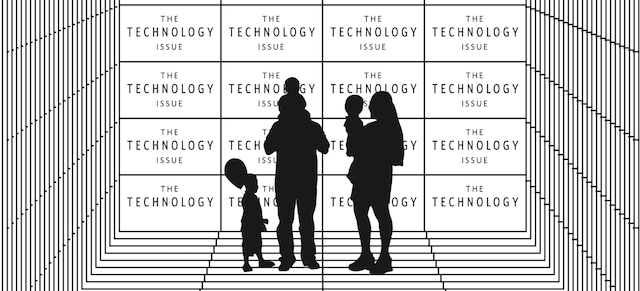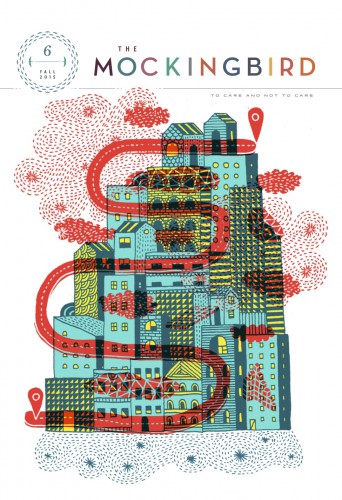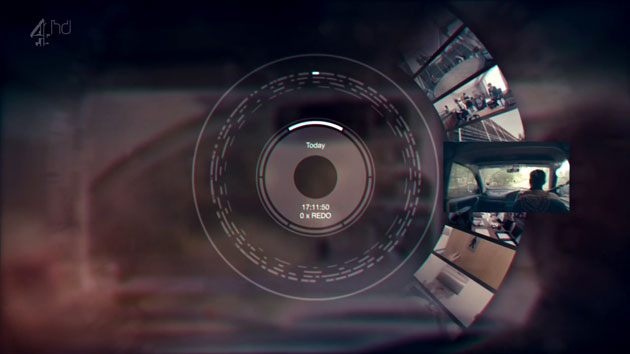
Below find the Table of Contents and Opener of our sixth issue, all about Technology. You can either subscribe directly, or sign up to be a monthly giver to Mbird, which includes a complimentary subscription to the magazine.
Opener
What if your entire life was recorded? Like instant-replay on Monday Night Football, what if you had playback for every minute of every day? And what if everybody else did, too? Think of all the problems that would suddenly disappear: forgotten names now remembered, favorite stories always accessible, mysterious crimes quickly solved. The moments that mattered most to us would be kept safely forever.
Unfortunately, the bad would come with the good. The BBC show Black Mirror takes this idea on in a first-season episode called “The Entire History of You.” If you’re unfamiliar, Black Mirror is like a tech-centric Twilight Zone. Based in the near future, each episode has its own plot and cast of characters, and revolves around some cataclysm made possible by our technologies. In this particular episode, humans are now using what’s called a Grain, an invisible chip implanted in the skin behind the ear, which records everything we do, see, and hear. With it you are able to “re-do” (or replay) everything you’ve ever experienced.
We see that this time-saving device is actually an immense burden for Liam, the main character. After replaying an interview at work again and again, this same process of overanalysis begins as he catches a private interaction between his wife and an old boyfriend at a cocktail party. When they get home, Liam can’t let it go; he sits up all night with a bottle of whiskey, re-watching the short series of exchanges his wife shares with this man, slowly building a case that his wife is having an affair.
The rest of the episode, as you might imagine, unrolls the dissolution of their marriage. What we find in “The Entire History of You” is not the clarifying power of pure facts, but the maddening human propensity to turn those facts into a case. In this world of “re-dos,” every memory is a tiny courtroom, and every lover becomes a lawyer.
The show’s creator, Charlie Brooker, says he decided to make this series of technological parables out of a sense of “worry” —worry about the nearness of these phenomena to our current lives. He’s right. The paranoia Liam experiences in this episode is the same paranoia we experience to varying degrees with our own online lives. “The Internet never forgets,” it’s been said. But that doesn’t keep us from finding comfort in the “Delete History” button on our browsers.
 The truth is, it’s easy to badmouth technology. As soon as anyone begins talking about its perils, though, there is the risk of sounding not just nostalgic, but downright ungrateful. We can argue the existential costs of our inventions, but the costs cannot hold an LED candle to the innumerable benefits those inventions have wrought. Cancers are more beatable, energy is more renewable, and global concerns are more approachable than ever. And on a day-to-day level, it’s just nice to have the conveniences of the information age; television shows and music reviews are a click away—so are updates from old friends and so is, of course, your entire archive of personal correspondence.
The truth is, it’s easy to badmouth technology. As soon as anyone begins talking about its perils, though, there is the risk of sounding not just nostalgic, but downright ungrateful. We can argue the existential costs of our inventions, but the costs cannot hold an LED candle to the innumerable benefits those inventions have wrought. Cancers are more beatable, energy is more renewable, and global concerns are more approachable than ever. And on a day-to-day level, it’s just nice to have the conveniences of the information age; television shows and music reviews are a click away—so are updates from old friends and so is, of course, your entire archive of personal correspondence.
On top of that, Mockingbird owes much of its life (and livelihood!) to the internet. What began as a blog has grown into a kind of media platform—with books and conferences and these very magazines—only because it first gained traction on the web. Considering the fates of newspapers and magazines worldwide, we have followed kind of a backward sequence, but we have certainly wondered, with bated breath, what would happen to all our work if the internet imploded one day. Lord knows that’s one of the reasons we wanted to have some work on paper.
At the same time, we believe the Gospel reaches people not where they should be, but where they actually live every day. For better or worse, in the twenty-first century, this has seemed to be online, and barring any widespread back-to-the-land movements, it’s not changing any time soon. Among twenty-somethings worldwide, over a quarter of them check Facebook before even getting out of bed. And, to be honest, my grandmother is more active on Facebook than I am!

Whether you are a millennial or a grandparent, though, the fact remains: culturally speaking, it is simply not an option to be uninterested in technology. While we may like to think we’re not really tech-savvy kinds of people, our data plans and GPS apps often demonstrate otherwise. “Technology” is no longer the stuff of Popular Science subscribers and computer programmers, it is for us. If you have, in the last week, shopped online or sent a text message or—heaven forbid!—gotten on Facebook, you, too, are one of us! We are its market and business is booming.
And this is not an inherently bad thing, either. We at Mockingbird may not be proud that we’re tracking our Twitter stats before we eat breakfast, but we also aren’t Luddites. For all the garbage that finds its way into our inboxes, there are also some real diamonds in there, too. The articles included in this issue were written by chronic Netflix bingers, iPhone addicts and social media devotees. In other words, normal people, just like you.
When it comes down to it, what we mean by ‘technology’ is very similar to what Charlie Brooker says about the title of his show. Like a screen that has been turned off, our relationship with technology works like a black mirror, a window not just onto our curated and filtered exteriors, but also beyond that, into the dark depths of our fixations and fears.
What do we find there, under our ping notifications and routine Google searches? What does our online life say about us?
That’s what we’re asking in the Technology Issue—not so much new gadgets as old Adams, and all the pixilated projections of him on our LCD screens. We look back at the dawn of the Walkman and the revolution of personal listening; we look forward to the age of personalized search engines and news sources. We have writing on holodecks and hovercrafts; we also have writing on professional bloggers, flip phone users, porn watchers and distracted parents. We have new poems from the brilliant Dick Allen, and an interview with Pulitzer finalist and acclaimed author of The Glass Cage, Nicholas Carr.
Through it all, we find that our searches continue, not for more bits of information, but for a way out—from our habitual distractions, from our handheld courtrooms and our own inner-prosecutors, from “The Entire History of Me.” With all our new-fangled devices, we continue to need the one thing that’s already been given—real love in the age of easy likes. Not only a black mirror, but a clean slate.
I hope this issue is a good reminder.
Ethan Richardson, Editor
https://www.youtube.com/watch?v=Sw3GIR70HAY
Contents
What 1,792 Blogposts Have Taught Me about the Internet by David Zahl
The Confessional
Automatic for the People: A Conversation with Nicholas Carr
Me, Myself and iPod by Jady Koch
Sending Morse Code, a poem by Dick Allen
 Is Google Searching Me? Knowledge and Discovery in the Internet Age by Ethan Richardson
Is Google Searching Me? Knowledge and Discovery in the Internet Age by Ethan Richardson
For the Record: On Our Bookshelf, Tech Reads, Sci-fi Consequences
All in All: Childhood, Security Objects, and Grace in the Digital Age by Stephanie Phillips
Revisiting the Second Grade Classroom, a poem by Dick Allen
Distracted Parents and the Media of Our Discontent by Ian Olson
Unreconciled and Disembodied: Why Sex on the Internet Sucks by Sarah Condon
Surfing the Net, a poem by Dick Allen
Time to Pull Over: Algorithms, Self-Driving Cars, and an Unkind Word about Fear by Bryan Jarrell
Mixed Messages: A Sermon by Aaron Zimmerman
Subscribe today! Or even better, sign up for (any amount of) monthly support of Mbird and you’ll never miss an issue.

COMMENTS
8 responses to “Introducing the Technology Issue!”
Leave a Reply














LOVE the cover!! Can’t wait to read!
Oh man! This one is going to be so so good.
I know we say it every time, but this is the best issue yet. Seriously. Could not possibly be more proud of it. #ethanrichardsonismyhero
Good, now read The Technological Bluff by Jacque Ellul.
Can’t wait to get mine! I hope you guys got my address change right!